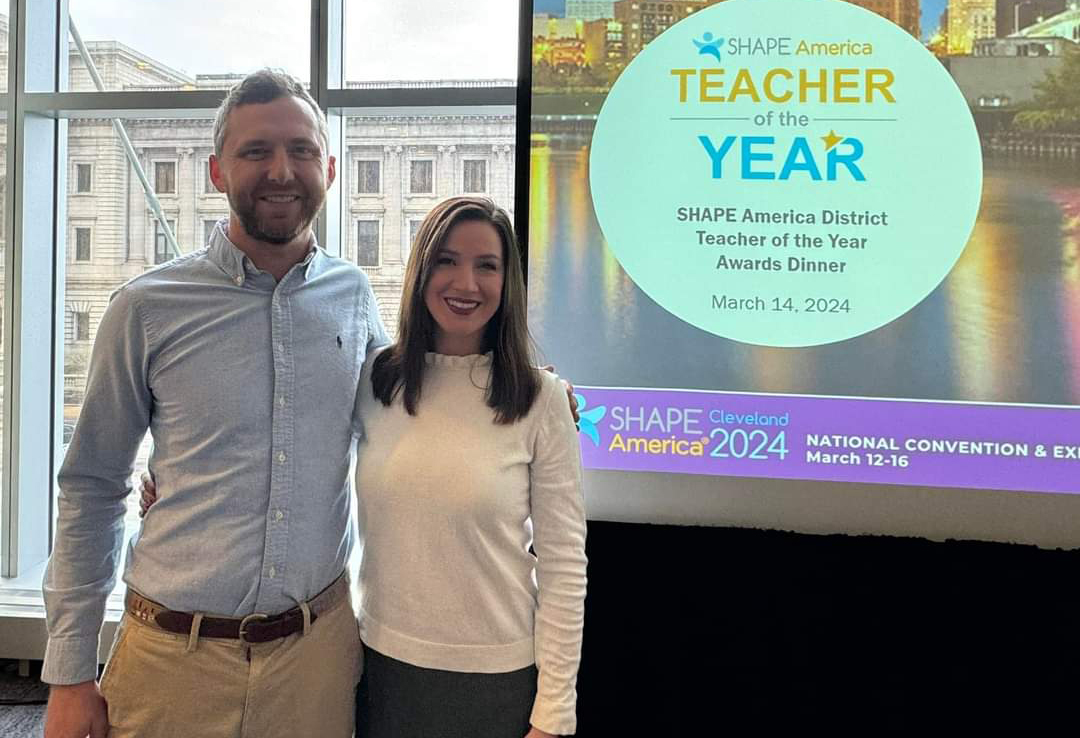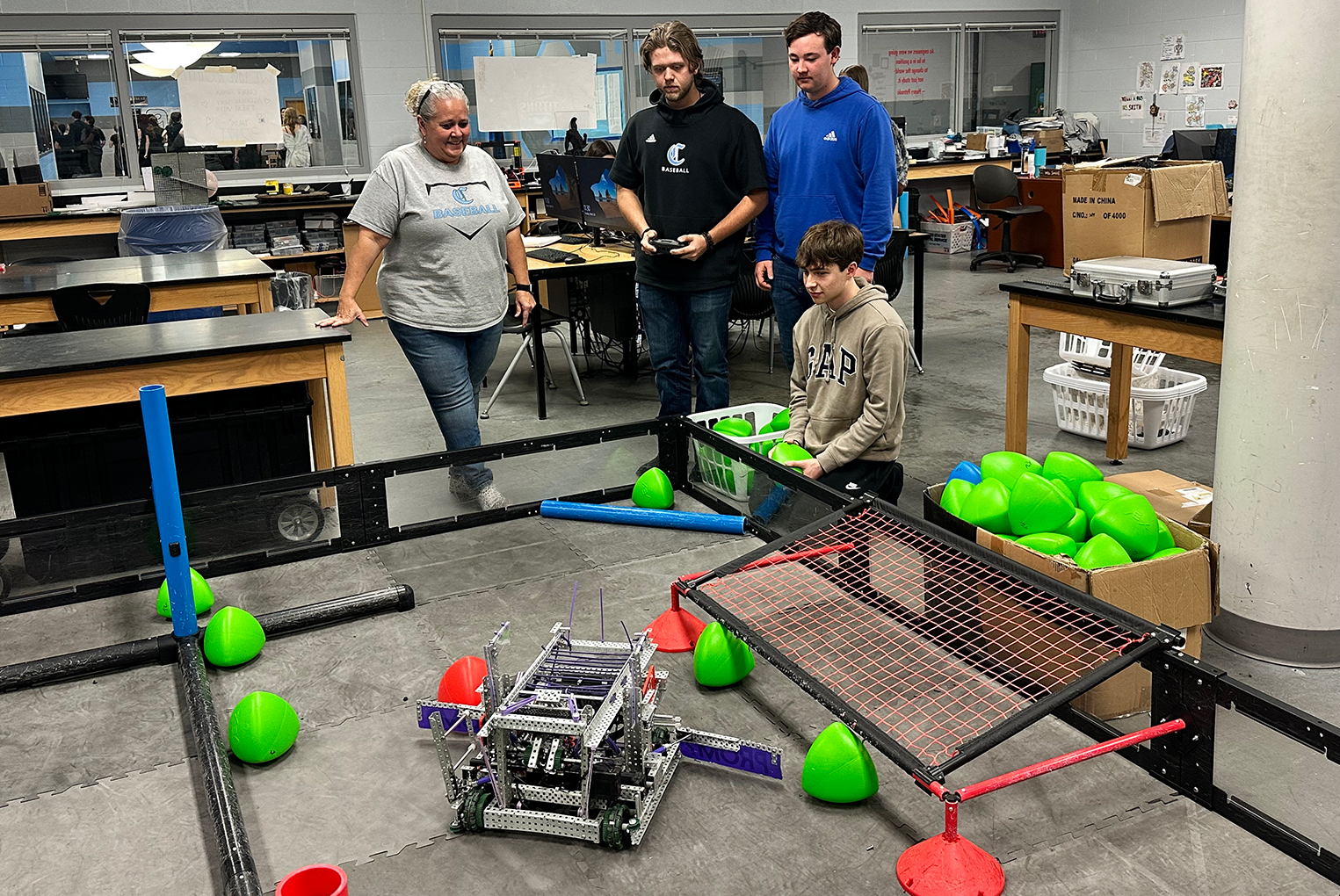
Dylan Tungate, a technology instructional assistant for Marion County Schools, looks on as Zach Nalley works on a Microsoft IT Academy course in Anita Milburn’s information technology class at Marion County Area Technology Center.
Photo by Mike Marsee, Nov. 4, 2015
By Mike Marsee
michael.marsee@education.ky.gov
Workers who know the ins and outs of the most frequently used technology have an edge. Kentucky schools have found more than one way to give their students that advantage.
Students are learning to master Microsoft programs through a Kentucky Department of Education pilot program that provides access to the Microsoft IT Academy. There is room for more schools to take advantage of funding that can be used to purchase memberships in the IT Academy and vouchers for student exams.
Kentucky’s Pilot Program
The KDE program began at the start of this school year after the Kentucky General Assembly designated funding to offer the Microsoft IT Academy to every high school and area technology center (ATC) in the state. The academy offers a technology curriculum that can be used to help students learn IT skills they will need in the workforce.
“So many of our industries and businesses are asking for our students to have those skills in computing,” said Laura Raganas, the IT Academy program manager with KDE’s Office of Knowledge, Information and Data Services. “It does give our students a little leg up.”
The legislature provided $800,000 to offer the program to 287 high schools and area technology centers. Raganas said 258 schools have signed up so far.
“We were really excited to be able to implement it this year,” said Tara Tatum, a business education teacher at Marion County High School. “Because of funding in the past, I haven’t been able to do that.”
Microsoft Office Specialist (MOS) certifications at the core level are available in Excel, Word, PowerPoint and Access. These certifications can count toward students’ college- and career-readiness certification, and some of them — such as Excel — offer a gateway to advanced IT skills that are highly desired by industry employers.
“I tell students every day that it’s not the most exciting class you’re going to have, but it’s going to be beneficial to you because you’re going to leave with the MOS certification, and that’s valued in the world of work,” Tatum said.
There are 22 career pathways in which the Microsoft programs can be used to directly support the college and career readiness preparation of Kentucky students.
“Information Technology and Business Education programs are certainly benefitting from the supports of the IT Academy” said Marissa Hancock, academic program manager with the Office of Career and Technical Education at KDE. “The IT Academy has enabled equal access to instructional support tools for teachers and certification vouchers for students.”
Each school enrolled in the pilot program has its own certified testing center for students. The cost of the test is paid for with vouchers provided through the KDE program.
Marion County Sees Value
Both Marion County High and the adjacent Marion County ATC began offering Microsoft IT Academy courses after Dylan Tungate, a technology instructional assistant for Marion County Schools, and Anita Milburn, an information technology instructor at Marion County ATC, attended a KDE training in August that attracted about 200 educators.
“We basically said, ‘This is something that we want to provide to our students,” Tungate said. “We shared resources with both (schools) and we just took off.”
Milburn said the academy allowed Marion County ATC to update its software from Microsoft Office 2010 to the 2013 version and allowed some returning students who already had introductory classes to get certified quickly.
“I tell students how important it is to have it on their resume,” Milburn said. And I’ve told them, too, what it would cost them if they took each one of those exams individually. Some of them have over $500 in certification vouchers, so that’s a big bonus.”
Tatum said Tungate, who graduated from Marion County High only two years ago, has been a valuable resource and a good example for students. He earned MOS certifications in 2014 and is working for the school district while attending Campbellsville University.
“Seeing and hearing what he’s done with all his certifications, it’s definitely eye-opening for them,” Tatum said.
Eastern Kentucky Gets Cooperative
Twelve eastern Kentucky schools that might not have been able to offer the course “Creative Coding Through Games and Apps” on their own are doing so through the IT Academy and a program offered by the Kentucky Valley Educational Cooperative.
“We were talking about things we need to do within our region to try to create opportunities for our students, and one of the things that was very glaring was that there was a lack of opportunities in computer science for our kids,” said Paul Green, who coordinates the KVEC program.
The IT Academy is helping to fulfill the mission of the Appalachian Technology Institute, an instructional model Green created as part of his work with KVEC’s Appalachian Renaissance Initiative, which helps bring technology education opportunities to students in a traditionally isolated region.
KVEC is using six teachers to offer the Creative Coding Through Games and Apps course in 12 schools, which have a total of 372 middle and high school students taking introduction to computer programming courses. They are sharing resources to serve schools that couldn’t otherwise offer those courses.
Green said funding was made available for certified teachers to travel to the schools on an as-needed basis, while online tutorials developed by the certified teachers allow the students to do much of the work independently. The students are supported by facilitators in each school.
“It’s that facilitator that really makes or breaks the program,” Green said. “It’s up to that facilitator to be the go-between.”
Green’s model has attracted the attention of officials at Microsoft, which is considering it as something it can promote in other states, Raganas said.
“They’re just doing a fantastic job,” Raganas said. “Some of the schools KVEC serves are very small schools, and they don’t have a business teacher on site or a computer science teacher on site.”
Green said he recently talked with educators in North Carolina and Virginia about his coding program.
“We think it’s a replicable model,” Green said. “We’ve got a budget of $30,000 or $40,000 and we’re reaching 372 kids for less than a teacher’s salary, so that’s pretty significant.”
He said he thinks the program will expand next year, with another 300 to 400 students enrolling in the introductory course and pathways being started for students who have completed it. He also is working with the computer science department at Eastern Kentucky University to get help in designing content and access to upper-level students who can serve as tutors.
Green said adjustments will be made next year, but he said this was a big step from having only two districts – Johnson and Lee counties – in a 19-district area offering any kind of computer science instruction.
“This is a rural area that traditionally hasn’t had these opportunities, and we’re tying it back to economic development,” Green said, noting the push to create fiber-optic communities in eastern Kentucky. “If we don’t have kids that have these skills and can do these things, then it’s not going to make an impact.”
Raganas said changes will be made at the state level, but she said the program has gained a great deal of momentum in recent months and should continue to grow thanks to the push from the General Assembly.
“Our legislature has done what our schools and teachers have wanted to but haven’t been able to because of budget,” she said. “We are doing a great job in trying to match the wants and needs of industry with the wants and needs of our students, and it’s definitely gained a lot of momentum in the last couple of months.”
MORE INFO …
Laura Raganas laura.raganas@education.ky.gov
Marissa Hancock marissa.hancock@eudcation.ky.gov
Anita Milburn anita.milburn@marion.kyschools.us
Tara Tatum tara.tatum@marion.kyschools.us
Dylan Tungate dylan.tungate@marion.kyschools.us
Paul Green paul.green@hazard.kyschools.us





Leave A Comment